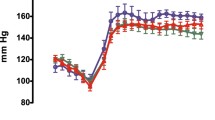Summary
Ketanserin is a serotonin S2-receptor antagonist that lowers blood pressure and inhibits platelet aggregation. Ketanserin treatment is also associated with prolongation of the corrected QT interval. The recently reported Prevention of Atherosclerotic Complications with Ketanserin (PACK) trial confirmed this prolongation of QT and also revealed a significant excess of deaths in patients receiving ketanserin together with potassium-losing diuretics. The investigators suggested that this excess of deaths may have been attributable to exacerbation of hypokalemia-induced ventricular arrhythmias by the repolarization-prolonging effect of ketanserin. However, drugs that prolong the QT interval may affect ventricular ectopic activity beneficially, and our study was designed to evaluate the effects of ketanserin on ventricular ectopic activity. Twenty patients (18 male, 2 female) aged 42–73 years were studied, each having at least 15 ventricular ectopic beats/hour. The study design was a double-blind, cross-over comparison of ketanserin, 40 mg twice daily, and placebo, both given for 1 week. Ventricular ectopic activity was assessed by 48-hour Holter electrocardiogram (ECG) tapes at the end of each treatment period. Ketanserin treatment was associated with prolongation of repolarization, as reflected by the significant mean increases in both QT interval (+30 ms; p<0.001) and corrected QT interval (+20 ms; p<0.05). The mean overall degree of ventricular ectopic activity, as represented by a score based on the Lown classification, was significantly reduced (p<0.05). This was associated with a concordant improvement in the individual indices of ectopic activity. Our results show that ketanserin significantly suppressed ventricular ectopic activity in our normokalemic patients. It would seem that the implications of ketanserin treatment for cardiac rhythm depend on the electrolyte environment. The drug appears to be potentially beneficial at normal potassium concentrations, but may carry the possibility of precipitating ventricular arrhythmias in the face of hypokalemia.
Similar content being viewed by others
References
Leysen JE, Awouters F, Kennis L, et al. Receptor binding profile of R41468, a novel antagonist at 5-HT2 receptors. Life Sci 1981;28:1015–1022.
Vanhoutte P, Amery A, Birkenhaeger W, et al. Serotonergic mechanisms in hypertension: Focus on the effects of ketanserin. Hypertension 1988;11:111–133.
De Clerck F, David JL, Janssen PAJ. Inhibition of 5-hydroxytryptamine-induced and amplified human platelet aggregation by ketanserin (R41468), a selective 5-HT2 receptor antagonist. Agents Actions 1982;12:388–397.
Nademanee K, Lockhart E, Pruitt C, Singh B. Cardiac electrophysiological effects of intravenous ketanserin in humans. J Cardiovasc Pharmacol 1987;10(Suppl 3):S81-S85.
Prevention of Atherosclerosic Complications with Ketanserin Trial Group. Prevention of atherosclerosic complications: Controlled trial of ketanserin. Br Med J 1989;298:424–430.
Lown B, Wolf M. Approaches to sudden death from coronary artery disease. Circulation 1971;44:130–142.
Hills M, Armitage P. The two period crossover clinical trial. Br J Clin Pharmac 1979;8:7–20.
Bazan A, Aldariz AE, Baglivo H, et al. QT prolongation by ketanserin and induction of malignant ventricular arrhythmia. Cardiologia 1985;5:588–592.
Author information
Authors and Affiliations
Rights and permissions
About this article
Cite this article
Marks, C., Dews, I., Gould, S.E. et al. The effects of ketanserin on ventricular ectopic activity in humans. Cardiovasc Drug Ther 4, 93–95 (1990). https://doi.org/10.1007/BF00053436
Issue Date:
DOI: https://doi.org/10.1007/BF00053436




